It is necessary to differentiate between two methods of implementing GA4 in order to achieve this, either via gtag.js or via Google Tag Manager.
Gtag.js
- For Google Analytics implemented via gtag.js add the
page_location field to the GA4 snippet and give it the cleaned page path
- note that the code for the cleanPageLocation() function is below
- add the code e.g. as a ... tag before the GA snippet
<!-- Global site tag (gtag.js) - Google Analytics -->
<script async src="https://www.googletagmanager.com/gtag/js?id=YOUR-
ID-HERE">
</script>
<script>
window.dataLayer = window.dataLayer || [];
function gtag(){dataLayer.push(arguments);}
gtag('js', new Date());
gtag('config', 'YOUR-ID-HERE', {
// here the below function goes..
'page_location': cleanPageLocation(),
});
</script>
GTM
If working with Google Tag Manager, you need to add below function to a JavaScript variable and apply it to the page_location field in the GA4 configuration tag:

Filter out Query Param
- note that the function only filters out the
c parameter as stated
- if you want to filter out other parameters, then update the
excludeStrings array
- when using this function in GTM, it has to be an anonymous function as per GTMs requirements. Meaning the first line has to be changed to
function() {
function cleanPageLocation() {
// define parameters to exclude
var excludeStrings = [
"c"
];
var addressString = new URL(document.location);
var queryString = addressString.search;
/* check if query string holds any parameters, otherwise just return the url without them */
if (queryString.indexOf("?") != -1) {
/* https://stackoverflow.com/questions/901115/how-can-i-get-query-string-values-in-javascript */
var getQueryParamsFromURL = function getQueryParamsFromURL() {
var match,
search = /([^&=]+)=?([^&]*)/g,
decode = function decode(s) {
return decodeURIComponent(s);
},
query = addressString.search.substring(1);
var urlParams = {};
while ((match = search.exec(query))) {
urlParams[decode(match[1])] = decode(match[2]);
}
return urlParams;
};
// create param object from query string
var urlParams = getQueryParamsFromURL();
/* if it holds any of the defined parameters, remove the key and keep the rest */
Object.keys(urlParams).map(function (key) {
if (excludeStrings.includes(key)) delete urlParams[key];
});
// Create filtered query string
var queryString = new URLSearchParams(urlParams).toString();
// add ? to querystring unless it's empty
if (queryString != "") queryString = "?" + queryString;
}
// return cleaned URL
return addressString.origin + addressString.pathname + queryString;
}
reference: https://bluerivermountains.com/en/ga4-query-parameter-exclusion
